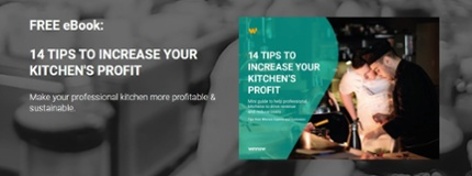We believe it’s time to take a serious look at waste. Based on work by WRAP, food waste costs the UK Hospitality and Food Service community £2.5bn per year in 2011, rising to £3.0bn in 2016 - equivalent to a quarter of its entire food procurement budget. However, when you go into a kitchen, there is a perception gap. Most chefs claim they don’t produce any waste. Over the next few weeks, we’ll be launching research with The Caterer to understand why this Perception Gap exists. We’ll be sending out a survey to many of you to explore this and will share the results they find. Our hope is support a fact based discussion around the opportunity to reduce waste, where companies are in looking at the opportunity, and what could be done to help the industry capture the opportunity.
When we first began speaking to chefs, many were proud to share that waste avoidance was a tenant in their training. They could point to examples of good waste reduction practices in their kitchen, expressing confidence they had relatively low food waste. One chef who ran a kitchen with 15 staff pointed to a small notebook and claimed that all waste was recorded there.
The perception permeates to the head office as well. Industry standard, for example, is to budget 3% to 5% of food costs to be wastage in the contract catering industry. Based on these assumptions, its easy to see why reducing food waste is not a strategic priority for many companies.
However, when comparing these figures to our own experience, as well as data from WRAP and other restaurant associations around the world, we see a different picture. If the cost of food waste is £2.5bn then many kitchens are wasting as much in food costs as they are making in net profits.
In the nearly 100 kitchens we’ve helped to monitor food waste, we’ve found that food waste can impact gross margins by 4% to 10%. Depending on the type of operation, the source of waste can vary. For example, in catering, the challenge is managing counter waste, where roughly 50% of the waste occurs. Restaurants, on the other hand, depending on the type of offer, the challenge is managing in kitchen production waste or plate waste.
Robustly monitoring and managing food waste can help you dramatically reduce food waste. Yet many sites believe that accurately measuring all food waste to be a time consuming effort. It doesn't have to be.
Technology can help chefs monitor food waste in a simple and powerful way. Historic methods of measuring waste such as production planning sheets are difficult to administer and are rarely used in a way to drive real change. Capturing and logging waste as its thrown away, then analysing that information and feeding back operational metrics to the head chef, allows operators to drive real sustained change.
Sites using our system to monitor and manage food waste, have cut food waste by 25% within the first month and 50% over the long run. Lower food costs through less waste drives a 2% to 6% margin improvement. Across all sites we’ve worked with, this equates to over 300,000 plated meals.
The effort required to measure the waste is just minutes a day. In fact, through reducing waste and therefore lowering production levels, sites cutting waste can get a second benefit of saving on labour costs.
Yet to realise these benefits we have to start having a healthy discussion around waste. It can’t be something that we assume is too small to worry about. We can’t have reservations to look at the issue because it we may be afraid at what we find.
WRAP and the Hospitality and Food Service Agreement have already started to build a dialogue around the issue. The Sustainable Restaurant Association is working with us to help small businesses that want to take a look at their waste.
To help us unpick this issue, we’re asking for your help to understand what you currently think about waste. In partnership with The Caterer, we’ll be sending out a survey to inquire what you think about food waste. By better understanding how we think about this as an industry, we believe we can stimulate a healthy dialogue about the issue.
Photo credit: Brkati Krokodil via Stocksy









Comment on my blog